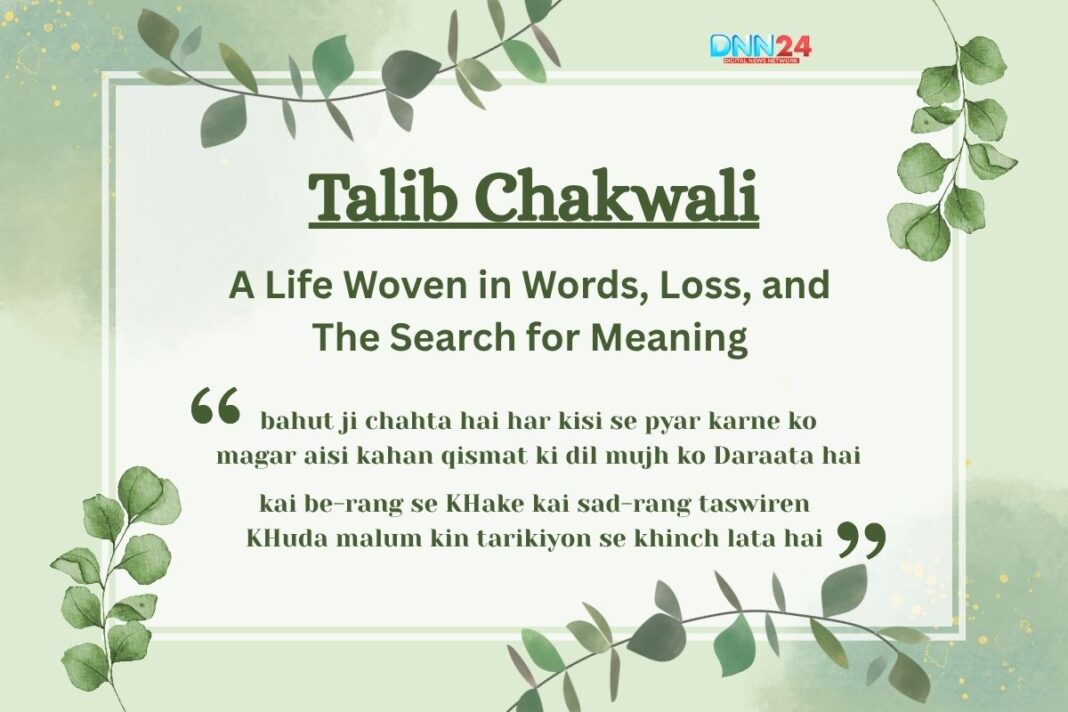Talib Chakwali, born as Manohar Lal Kapur on May 13, 1900, in Chakwal, Punjab (now in Pakistan), was more than just a name in Urdu literature—he was a soul whose life and words painted a vivid tapestry of passion, struggle, and identity. Talib was an orphan, as he was born when his father, Bal Mukand Kapur, was the only son of the house. Talib was raised by his wealthy zamindar grandfather, Ishwar Das, and his childhood was full of loss, but it was cushioned by privilege. His family background was a history, originating in Balkh in ancient Afghanistan, which moved to Peshawar, then to Chakwal.
bezar zindagi se dil-e-muzmahil nahin
Talib Chakwali
shayad ba-qadr-e-zarf abhi dard-e-dil nahin
Such geographical and cultural shifts perhaps sowed the seeds of his poetic emotions. Educated in Lahore, he earned his BA (Hons.) in 1921 and LLB in 1923, stepping into the world of law but with heart and soul devoted to poetry. Having begun his career as a lawyer, his life had several twists, such as his own business in building materials in Rawalpindi and then eventually migrating to Delhi following the dislocation of Partition in 1947.
gham-e-dil ki zaban ahl-e-tashaddud kam samajhte hain
Talib Chakwali
na dil ko dil samajhte hain na gham ko gham samajhte hain
Talib was a successful businessman, but his mind never went too far, poetry was a getaway, where he could talk when the waters of personal and national history raged. His marriage to Krishnawati in 1921 was also a significant period of companionship and family fortitude in a life with its measure of emotional depth and complexity. His narrative is more than a word-by-word account, but the man of the words- a survival story, a story of identity and an unending interest in the beauty of literature.
mera aaina meri shakl dikhata hai mujhe
Talib Chakwali
ye wo apna hai jo begana batata hai mujhe
The Poet and His Craft: Inspirations and Innovations
Talib Chakwali’s literary journey began with poetry in English and Punjabi during his education, but swiftly transformed into Urdu, where he found his authentic poetic voice. In 1932, he started Bazm e Adab, an organisation representing his passion for enhancing Urdu literature. His poetry also appeared in the shade of some larger influences-William Wordsworth and Percy Shelley, who influenced his romantic and philosophic tendencies; Ghalib, Zauq and Iqbal, the great masters of Urdu poetry, who influenced his attitude to ghazal and nazm.
KHwab aur haqiqat ki taswir nazar aai
Talib Chakwali
tadbir inan-gir-e-taqdir nazar aai
Chakwali’s first poetry collection, Anwaar-e-Haqiqat, appeared in 1929, signalling the arrival of a distinctive voice in Urdu poetry. His later works, including Barg-e-Sabz (1965) and Mor Pankh (1987), continued to explore themes of truth, beauty, sorrow, and hope. His poetry has an emotional tone on the brink of pain and consolation, portraying the paradoxes of life, love, and patriotism.
aafat-e-musalsal mein ek rabt nazar aaya
Talib Chakwali
haalat-e-digar-gun mein zanjir nazar aai
Talib was not like many; his poems did not speak only of his personal feelings, but also of a society, and his philosophies were usually intertwined with classical Urdu poetry, its lyrical beauty. His pen name, “Talib,” meaning “seeker,” fittingly summarises his poetic quest for meaning and transcendence amid life’s challenges.
be-kaif masarrat bhi musibat si lage hai
Talib Chakwali
ai dost mujhe gham ki zarurat si lage hai
Unheard Stories and Personal Struggles: A Silent Battle
The words of opulence came with a life of untold stories of hardship and unspoken sufferings. Talib Chakwali’s life intersected with historical tragedies—the trauma of losing his father early, disruptions caused by Partition, and the challenge of migrating and establishing himself anew in Delhi. These were the things on which his emotional material was based, but which seldom found their way into the language of the time or literary criticism and thus constituted the mute layers of his story.
KHizan ba-rang-e-bahaaran hai dekhiye kya ho
Talib Chakwali
sukun ke bhes mein tufan hai dekhiye kya ho
More than the individual, it was ground-breaking that he wrote Urdu poetry as a Punjabi Hindu in a literary world dominated by Muslims. The cultural and religious boundaries were crossed subtly and radically. His poetry is also complete of a man struggling with the problem of existence, the suffering of loss, the desire to find someone to share it with, and the confusion of being lost. His sorrowful and at the same time hopeful poems show his inner contradictions and his resignation to the impermanence of life.
ilahi KHair ho haalat hi digar-gun hain
Talib Chakwali
kabhi jo kufr tha iman hai dekhiye kya ho
Talib’s struggle was internal and external—between the comforts of the past and uncertainties of the present, between societal expectations and personal truth. A combination of the individual and the universal makes his work carry a special emotional resonance that still resonates with readers nowadays.
rawan-dawan the jo lamhat ruk gae yak-dam
Talib Chakwali
sukut-e-sham-e-ghariban hai dekhiye kya ho
Legacy of a Seeker: Talib Chakwali’s Enduring Impact
Talib Chakwali passed away in 1988 in Delhi, leaving a legacy far richer than the typical poetic oeuvre. His works, sincerity of feeling, and philosophical maturity are still examples to the reader and the poet. The unique features of Talib’s life story and poetry are personal, historical, heartfelt, and intellectual.
mujh ko dimagh-e-garmi-e-bazar hai kahan
Talib Chakwali
afsurdagi mein lazzat-e-guftar hai kahan
The exploration of identity, love, pain, and the search for truth were some aspects of his poetic journey with no time limits or cultural restrictions. His works are nowadays studied not only as literature, but also as bridges between emotions and culture. The legacy of Talib is also seen in his contribution to the popularisation of Urdu poetry among Hindus and non-Muslims, as well as the Indian cultural syncretism of literature.
yaran-e-maslahat mein nahin jauhar-e-wafa
Talib Chakwali
ahl-e-gharaz mein KHubi-e-kirdar hai kahan
The life of this brave, imaginative, humble man, who lived through his hardships with dignity, has inspired many who need to find beauty and meaning in the face of seeming adversity. Remembering Talib Chakwali is to celebrate a poet who lived the art he created—a seeker who found in words the power to heal, question, and illuminate the complexities of human existence.
lakhon ki bhiD mein bhi hun sab se alag-thalag
Talib Chakwali
is shahr mein gharib ka gham-KHwar hai kahan
Also Read: Dil Shahjahanpuri: The Poet Who Turned Pain into Poetry
You can connect with DNN24 on Facebook, Twitter, and Instagram and subscribe to our YouTube channel.



